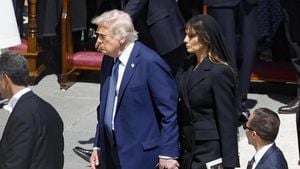Consumer packaged goods giant Mondelez International is reportedly eyeing acquisition opportunities within the U.S. chocolate market, particularly targeting Hershey Co. This renewed interest marks the second time Mondelez has sought to acquire the iconic American chocolate brand, as per reports surfacing from Bloomberg. Initial talks have commenced as Mondelez has made preliminary approaches, indicating the desire for what could become one of the largest food and beverage conglomerates globally.
The history between these two companies has been complicated. Back in 2016, Mondelez attempted to purchase Hershey for $23 billion, but the offer was rejected unanimously by Hershey's board at the time. Despite this setback, Mondelez hasn't shied away from pursuing Hershey once again, as the potential acquisition could yield significant advantages for both parties.
A successful acquisition would enable Mondelez to build upon Hershey's strong brand image, gaining enhanced access to the lucrative U.S. chocolate market and potentially creating total sales nearing $50 billion collectively. Industry experts have suggested this timing is ripe, as Hershey recently reported third-quarter earnings which fell short of analyst expectations. This might create additional urgency for Hershey to reassess its market positioning.
Currently, Hershey’s market capitalization is valued at approximately $39.19 billion, with shares having fluctuated recently. Year-to-date, Hershey's stock has risen more than 10%, driven by investors' optimism about potential growth and market adaptability. Concerns, nonetheless, have been raised around surging cocoa prices and the rising adoption of GLP-1 medications, both of which have contributed to the volatility of Hershey's stock this year.
Similar trends have been observed across the consumer packaged goods sector, which has grappled with inflation and shifting consumer demands. Price hikes have impacted purchasing behavior, pushing corporations to pursue strategic mergers and acquisitions as growth strategies. For example, Mars, which owns M&M's, had acquired Pringles maker, Kellanova, for approximately $36 billion, highlighting the trend of consolidation within the industry.
Mondelez, best known for its snack brands including Oreo, Cadbury, and Ritz, has shown openness to mergers and acquisitions. Analysts have noted the company's solid debt capacity could facilitate significant growth through strategic transactions. Recently, the company also expanded its portfolio by taking over 51% of Evirth, a Chinese cakes and pastries maker, signaling aggressive growth strategies across international markets.
The synergy projected from the merger with Hershey may also allow Mondelez to leverage both brands' distribution channels. This could lead to innovative offerings within the beloved chocolate category, tapping new consumer trends toward premium and indulging experiences.
Market speculation surrounding Mondelez's potential acquisition has rejuvenated discussions about corporate control dynamics—particularly concerning Hershey’s dual-class share structure controlled largely by the Hershey Trust. This structure provides the trust with significant voting power, allowing it to maintain control over Hershey’s board and strategic direction, presenting potential challenges for any takeover attempt.
The Hershey Trust's involvement has been pivotal historically, as seen during prior acquisition discussions, such as when it blocked Wrigley’s transaction efforts. Pennsylvania law allows the attorney general to intervene with corporate governance matters, especially where charitable trusts are concerned, adding another layer of complexity to potential negotiations.
While Hershey has remained independent since its inception by Milton Hershey over 120 years ago, the industry’s current climate—marked by inflation and changing consumer preferences—could lead to shifts. Companies within the sector are compelled to re-evaluate their stances amid pressures from rising operational costs coupled with diminishing product volumes.
Throughout the months to come, as negotiations progress and the consumer market fluctuates, industry watchers are eager to see how Mondelez positions itself within this acquisition narrative. Should negotiations culminate happily, it could frame the balance of market power distinctively across the U.S. confectionery space.
The backdrop of these discussions demonstrates not only the shifting sands of consumer demand but also the innovative strategies prominent firms like Mondelez are willing to adapt to. This move might just be the tip of the iceberg concerning the future state of the food industry, with potential larger entities vying for their share to remain competitive. Such industry maneuvers can shape brand identities and consumer experiences far beyond just mergers and acquisitions, setting the stage for the future of how snacks are positioned and delivered to consumers worldwide.
Mondelez's exploration of Hershey's acquisition provides insights not just about corporate strategy but also about the evolution of consumer preferences. The relationship between these two iconic brands continues to evolve, with each move closely followed by industry analysts and consumers alike.



